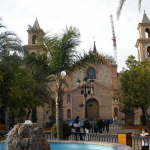Last updated on September 13th, 2019 at 09:08 am.
It may seem very far removed from beaches and bars, but what happens in Spain’s local and general elections is of great importance to everyone with a property in Spain and not only those who live here. The political climate impacts on day-to-day lives probably more than we realise. Until there’s a change.
Following the last local elections there has been a significant change in the majority of local councils. In this article we look at the process that led to this and what we can expect now and in the future.
Local, regional and national
In Spain there are local, regional and national, or general, elections. Those occurring on 24th May were the local and regional opportunities for constituents to choose their politicians. The local elections in Spain were held to elect the town mayor and his/ her councillors. The regional elections were to elect the regional mayor and councillors.
Those not holding a Spanish passport who are eligible to vote in Spain, can vote in the local elections but not the regional ones. Neither can they vote in the general election.
Similar parties are presenting in all tiers of political life in Spain:
PP = Partido Popular – centre right
PSOE = socialist party – centre left
Podemos = anti-austerity and associated with the left
Ciudadanos = anti-corruption and associated with the right
IU = United left
Los Verdes = Green Party
In the local and regional elections there has emerged a number of small independent parties in most towns which have been backed by Podemos. Podemos did not put their own representatives forward in these elections. For example, en Común in Zaragoza is the Podemos option and Por Cádiz Si Se Puede in Cádiz.
Podemos and Ciudadanos have both attracted support as a result of public outrage against corruption and disaffection with the two main parties the PP and PSOE. They have taken a very grass routes and social media approach to their politics and this reaching out has, through alternative media, made a difference to their campaigns.
A different system
Spain has proportional representation and instead of voting for an individual politician you vote for the party. Each party will nominate from their ranks a number of politicians according to order from first downwards. Their list of potential candidates matches the number of councillors the town can have.
If they receive a certain proportion of the votes then the first on their list will become a councillor and the second if they get more, and so on down until, in theory, they could take every council place.
Rather than putting a piece of paper in the ballot box marked with a cross you select the ‘list’ of councillors for the party you want and put them in a sealed envelope that then goes in the ballot box.
The elections here are held on Sunday and in schools. There are a number of volunteers who help to supervise the smooth running of the election and they usually are made up from the different parties you can vote for. The campaigning for the elections is a carefully controlled event and the day before the election itself, no campaigning is allowed.
What happened on May 23rd?
Proportional representation might make sure that votes are reflected in the number of councillors but on May 23rd it meant that no clear majorities were achieved across Spain in the town and city halls. The PP party which had previously held many of these municipalities and regions suddenly found that they had lost many of their seats.
They might still have been the party with the most votes in total but the number of different parties running meant that they had no clear majority and therefore no mandate without forming a pact with another party. This proved to be more than problematic.
Many of the parties in opposition to the PP are left-leaning parties. As such, they were not prepared to join forces with the PP. Instead in town halls across the country, the smaller parties rallied together with the PSOE to form coalitions largely intent upon ousting the PP. A task that they have been successful in doing.
In some cases this has overturned a PP who has ruled in an area for decades. The issue now will be whether the fragmentation of councillors can lead to productive decisions being made.
What will happen in November?
Now the local elections are over then all eyes are on the general election in November. The Spanish Prime Minister, Mariano Rajoy, has announced that he will not be bringing the election forward.
Neither does Rajoy appear to be keen on change. Given the knock that the PP took in the local elections, change might have been considered to be a necessity. But the PP is set in its tracks and shows little inclination of budging from them.
In the end, in the run up to the general election we will see speculation and polls. Of course, these aren’t always accurate and people might have chosen to express their frustration locally rather than nationally. However, it will certainly be an interesting period in Spain’s history.
No comments yet
There are no comments on this post yet.




Leave a comment